Comparison of Roles and Characteristics of Leaders and Managers
VerifiedAdded on 2023/01/18
|16
|5232
|93
AI Summary
This report compares the roles and characteristics of leaders and managers in the context of an organization. It discusses the functions of managers in different situations and explores various theories of leadership. The report also examines the importance of conflict management and the ability to adapt to fast changes in the business environment. Additionally, it discusses the situational leadership theory, system leadership theory, and contingent leadership theory.
Contribute Materials
Your contribution can guide someone’s learning journey. Share your
documents today.
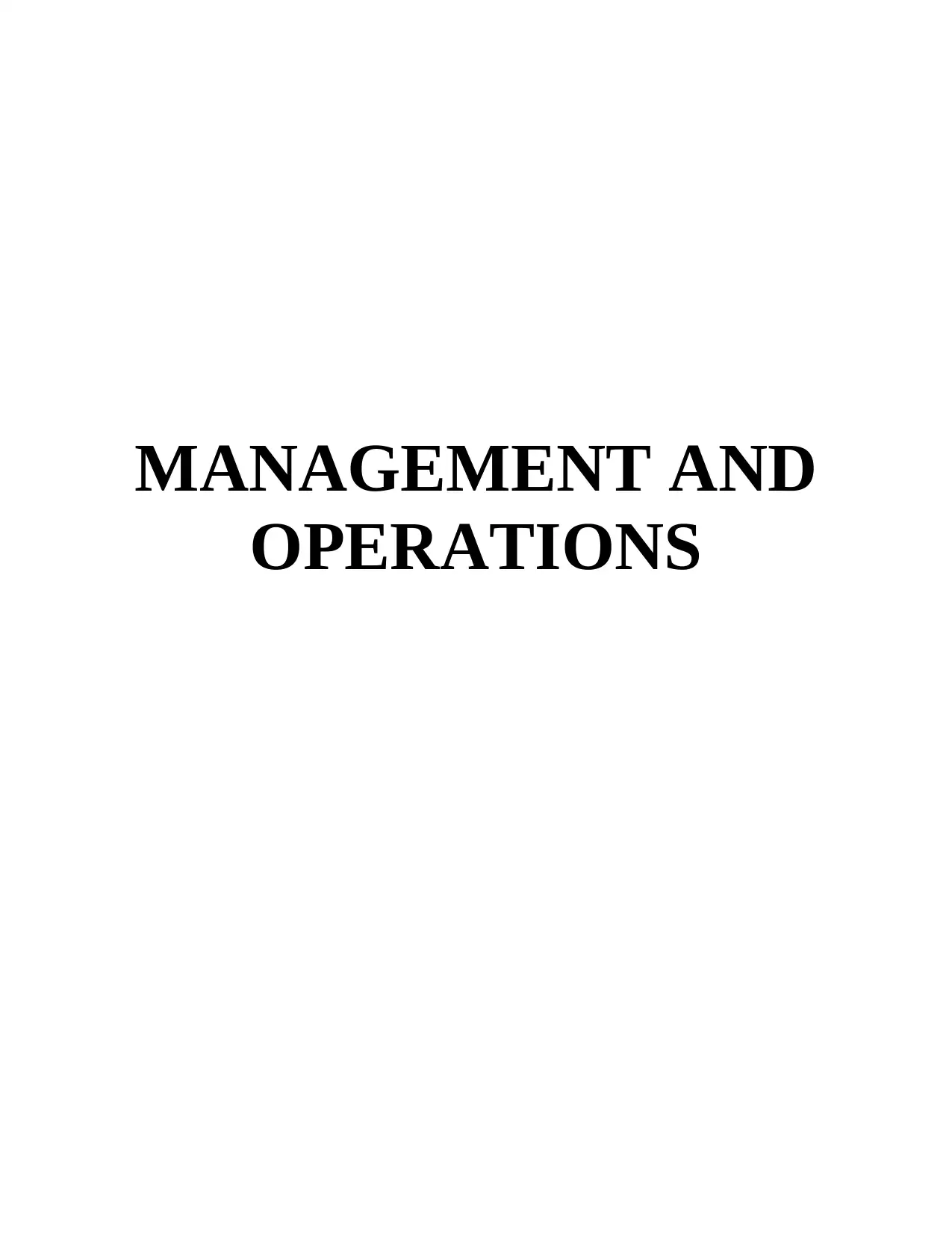
MANAGEMENT AND
OPERATIONS
OPERATIONS
Secure Best Marks with AI Grader
Need help grading? Try our AI Grader for instant feedback on your assignments.
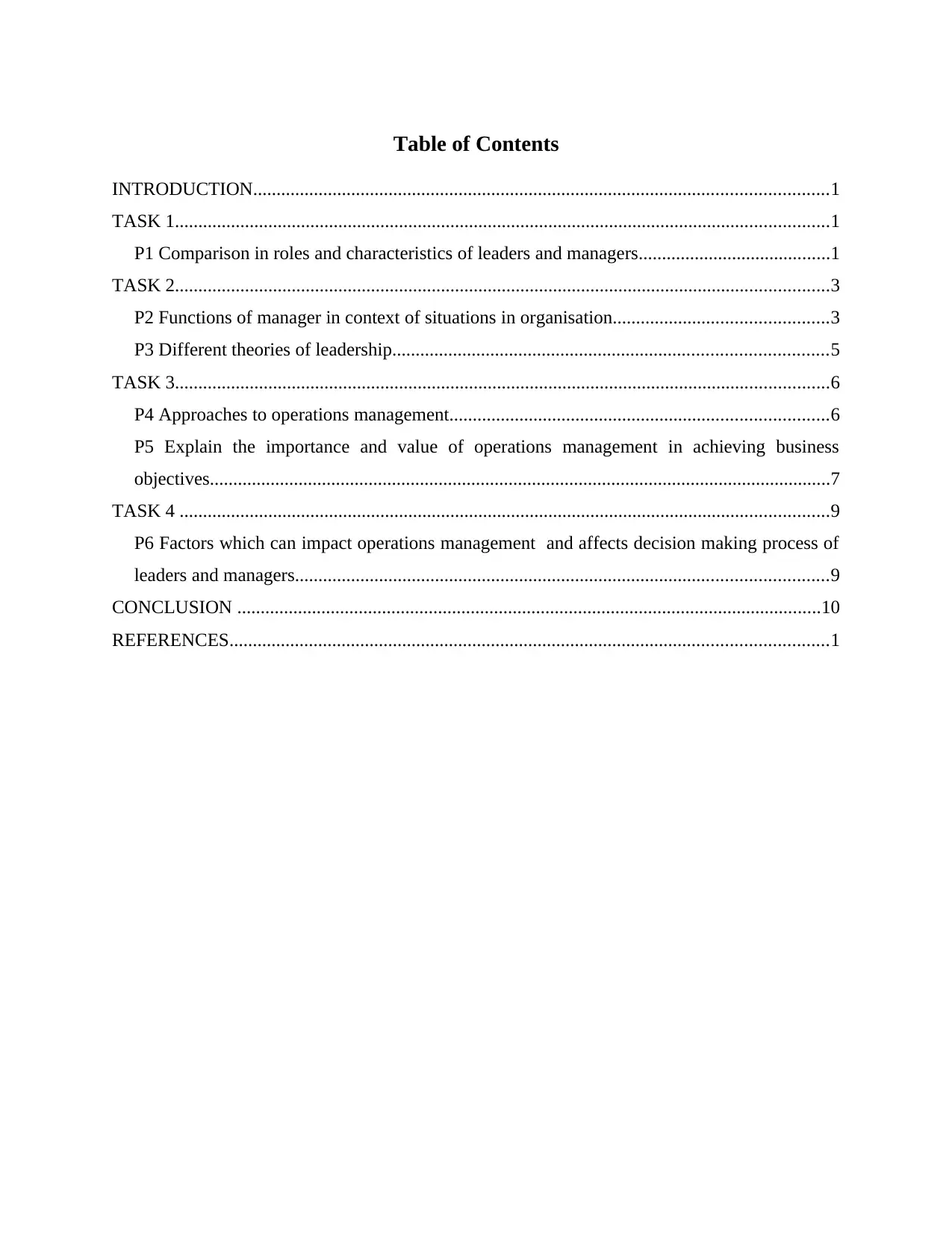
Table of Contents
INTRODUCTION...........................................................................................................................1
TASK 1............................................................................................................................................1
P1 Comparison in roles and characteristics of leaders and managers.........................................1
TASK 2............................................................................................................................................3
P2 Functions of manager in context of situations in organisation..............................................3
P3 Different theories of leadership.............................................................................................5
TASK 3............................................................................................................................................6
P4 Approaches to operations management.................................................................................6
P5 Explain the importance and value of operations management in achieving business
objectives.....................................................................................................................................7
TASK 4 ...........................................................................................................................................9
P6 Factors which can impact operations management and affects decision making process of
leaders and managers..................................................................................................................9
CONCLUSION .............................................................................................................................10
REFERENCES................................................................................................................................1
INTRODUCTION...........................................................................................................................1
TASK 1............................................................................................................................................1
P1 Comparison in roles and characteristics of leaders and managers.........................................1
TASK 2............................................................................................................................................3
P2 Functions of manager in context of situations in organisation..............................................3
P3 Different theories of leadership.............................................................................................5
TASK 3............................................................................................................................................6
P4 Approaches to operations management.................................................................................6
P5 Explain the importance and value of operations management in achieving business
objectives.....................................................................................................................................7
TASK 4 ...........................................................................................................................................9
P6 Factors which can impact operations management and affects decision making process of
leaders and managers..................................................................................................................9
CONCLUSION .............................................................................................................................10
REFERENCES................................................................................................................................1
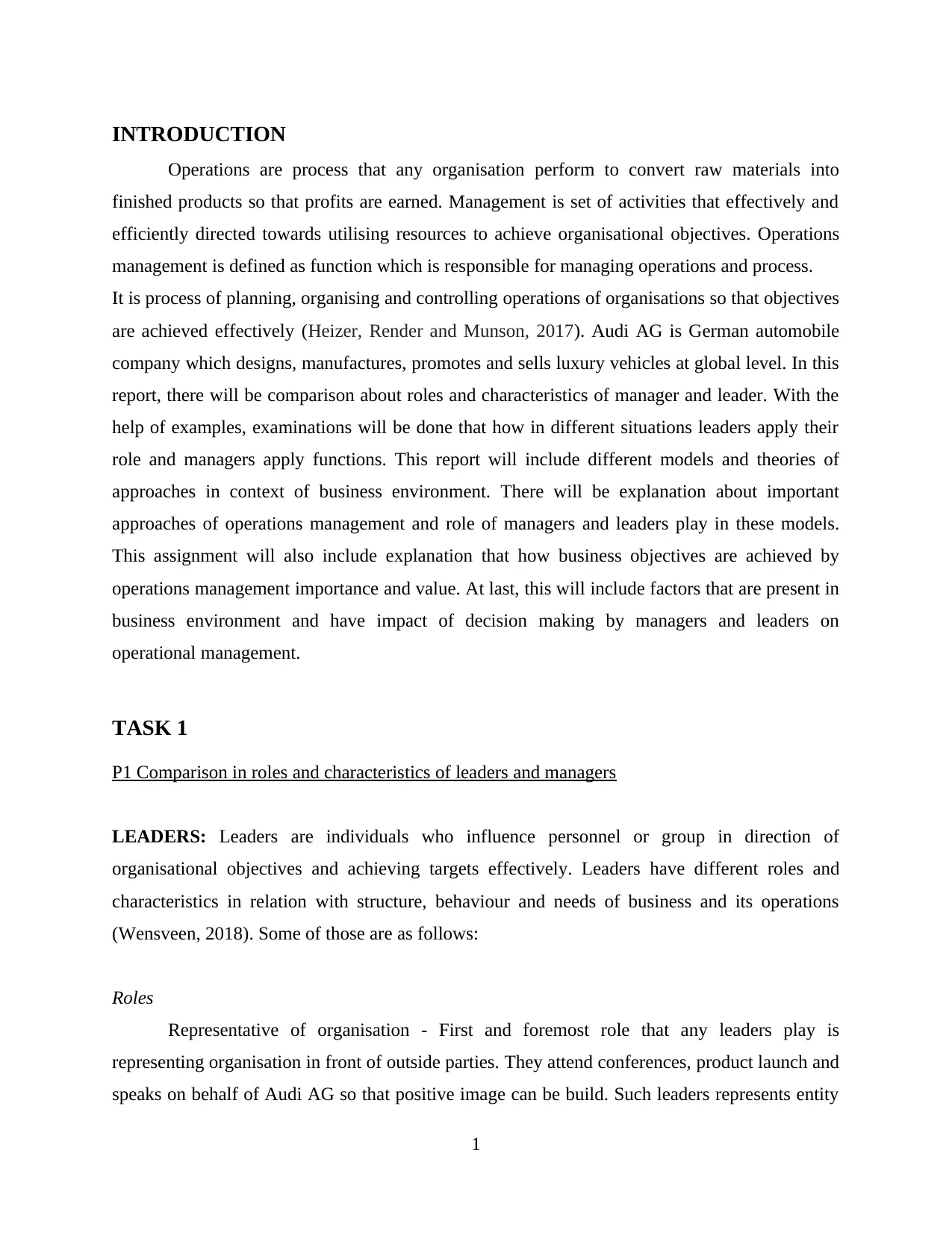
INTRODUCTION
Operations are process that any organisation perform to convert raw materials into
finished products so that profits are earned. Management is set of activities that effectively and
efficiently directed towards utilising resources to achieve organisational objectives. Operations
management is defined as function which is responsible for managing operations and process.
It is process of planning, organising and controlling operations of organisations so that objectives
are achieved effectively (Heizer, Render and Munson, 2017). Audi AG is German automobile
company which designs, manufactures, promotes and sells luxury vehicles at global level. In this
report, there will be comparison about roles and characteristics of manager and leader. With the
help of examples, examinations will be done that how in different situations leaders apply their
role and managers apply functions. This report will include different models and theories of
approaches in context of business environment. There will be explanation about important
approaches of operations management and role of managers and leaders play in these models.
This assignment will also include explanation that how business objectives are achieved by
operations management importance and value. At last, this will include factors that are present in
business environment and have impact of decision making by managers and leaders on
operational management.
TASK 1
P1 Comparison in roles and characteristics of leaders and managers
LEADERS: Leaders are individuals who influence personnel or group in direction of
organisational objectives and achieving targets effectively. Leaders have different roles and
characteristics in relation with structure, behaviour and needs of business and its operations
(Wensveen, 2018). Some of those are as follows:
Roles
Representative of organisation - First and foremost role that any leaders play is
representing organisation in front of outside parties. They attend conferences, product launch and
speaks on behalf of Audi AG so that positive image can be build. Such leaders represents entity
1
Operations are process that any organisation perform to convert raw materials into
finished products so that profits are earned. Management is set of activities that effectively and
efficiently directed towards utilising resources to achieve organisational objectives. Operations
management is defined as function which is responsible for managing operations and process.
It is process of planning, organising and controlling operations of organisations so that objectives
are achieved effectively (Heizer, Render and Munson, 2017). Audi AG is German automobile
company which designs, manufactures, promotes and sells luxury vehicles at global level. In this
report, there will be comparison about roles and characteristics of manager and leader. With the
help of examples, examinations will be done that how in different situations leaders apply their
role and managers apply functions. This report will include different models and theories of
approaches in context of business environment. There will be explanation about important
approaches of operations management and role of managers and leaders play in these models.
This assignment will also include explanation that how business objectives are achieved by
operations management importance and value. At last, this will include factors that are present in
business environment and have impact of decision making by managers and leaders on
operational management.
TASK 1
P1 Comparison in roles and characteristics of leaders and managers
LEADERS: Leaders are individuals who influence personnel or group in direction of
organisational objectives and achieving targets effectively. Leaders have different roles and
characteristics in relation with structure, behaviour and needs of business and its operations
(Wensveen, 2018). Some of those are as follows:
Roles
Representative of organisation - First and foremost role that any leaders play is
representing organisation in front of outside parties. They attend conferences, product launch and
speaks on behalf of Audi AG so that positive image can be build. Such leaders represents entity
1
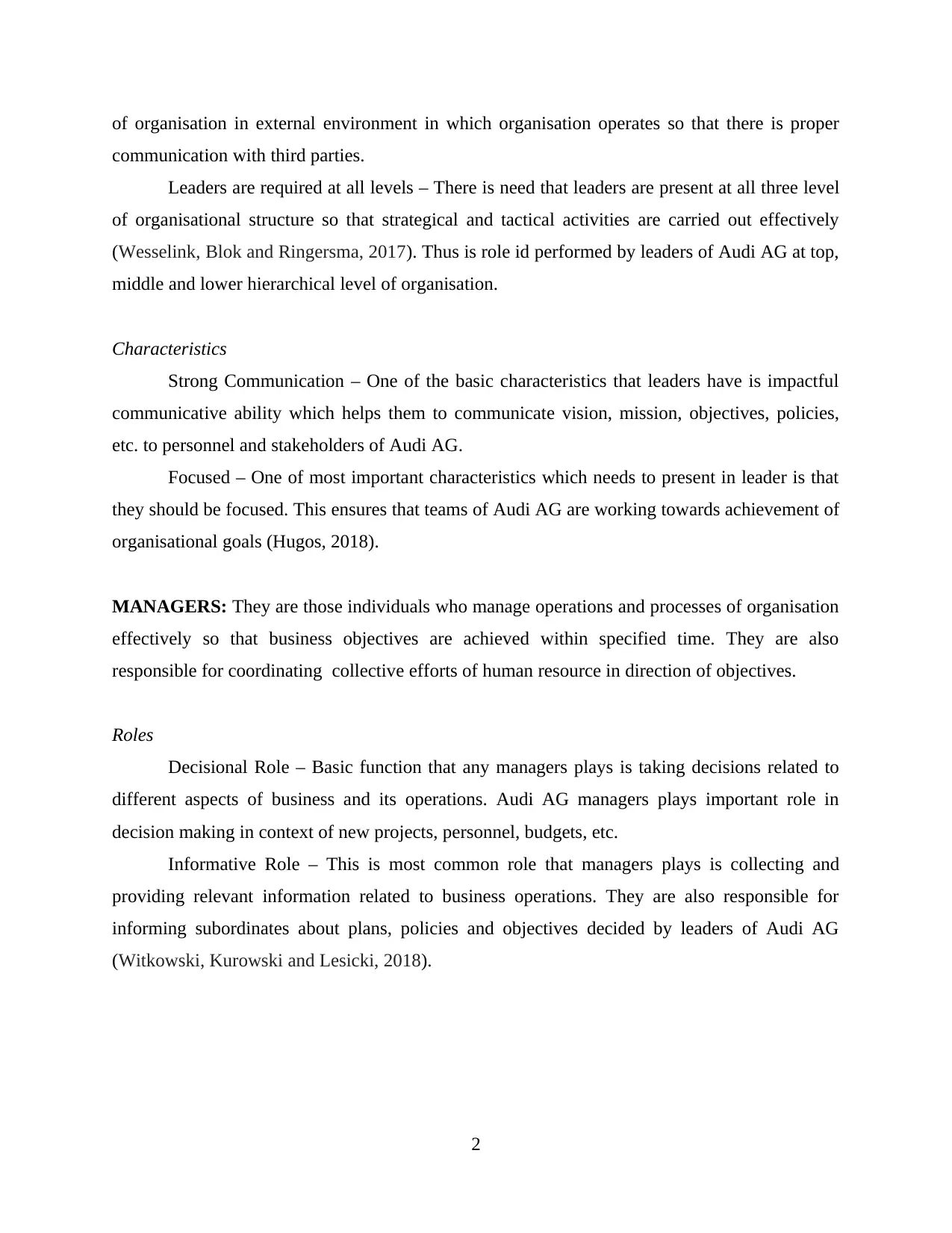
of organisation in external environment in which organisation operates so that there is proper
communication with third parties.
Leaders are required at all levels – There is need that leaders are present at all three level
of organisational structure so that strategical and tactical activities are carried out effectively
(Wesselink, Blok and Ringersma, 2017). Thus is role id performed by leaders of Audi AG at top,
middle and lower hierarchical level of organisation.
Characteristics
Strong Communication – One of the basic characteristics that leaders have is impactful
communicative ability which helps them to communicate vision, mission, objectives, policies,
etc. to personnel and stakeholders of Audi AG.
Focused – One of most important characteristics which needs to present in leader is that
they should be focused. This ensures that teams of Audi AG are working towards achievement of
organisational goals (Hugos, 2018).
MANAGERS: They are those individuals who manage operations and processes of organisation
effectively so that business objectives are achieved within specified time. They are also
responsible for coordinating collective efforts of human resource in direction of objectives.
Roles
Decisional Role – Basic function that any managers plays is taking decisions related to
different aspects of business and its operations. Audi AG managers plays important role in
decision making in context of new projects, personnel, budgets, etc.
Informative Role – This is most common role that managers plays is collecting and
providing relevant information related to business operations. They are also responsible for
informing subordinates about plans, policies and objectives decided by leaders of Audi AG
(Witkowski, Kurowski and Lesicki, 2018).
2
communication with third parties.
Leaders are required at all levels – There is need that leaders are present at all three level
of organisational structure so that strategical and tactical activities are carried out effectively
(Wesselink, Blok and Ringersma, 2017). Thus is role id performed by leaders of Audi AG at top,
middle and lower hierarchical level of organisation.
Characteristics
Strong Communication – One of the basic characteristics that leaders have is impactful
communicative ability which helps them to communicate vision, mission, objectives, policies,
etc. to personnel and stakeholders of Audi AG.
Focused – One of most important characteristics which needs to present in leader is that
they should be focused. This ensures that teams of Audi AG are working towards achievement of
organisational goals (Hugos, 2018).
MANAGERS: They are those individuals who manage operations and processes of organisation
effectively so that business objectives are achieved within specified time. They are also
responsible for coordinating collective efforts of human resource in direction of objectives.
Roles
Decisional Role – Basic function that any managers plays is taking decisions related to
different aspects of business and its operations. Audi AG managers plays important role in
decision making in context of new projects, personnel, budgets, etc.
Informative Role – This is most common role that managers plays is collecting and
providing relevant information related to business operations. They are also responsible for
informing subordinates about plans, policies and objectives decided by leaders of Audi AG
(Witkowski, Kurowski and Lesicki, 2018).
2
Secure Best Marks with AI Grader
Need help grading? Try our AI Grader for instant feedback on your assignments.
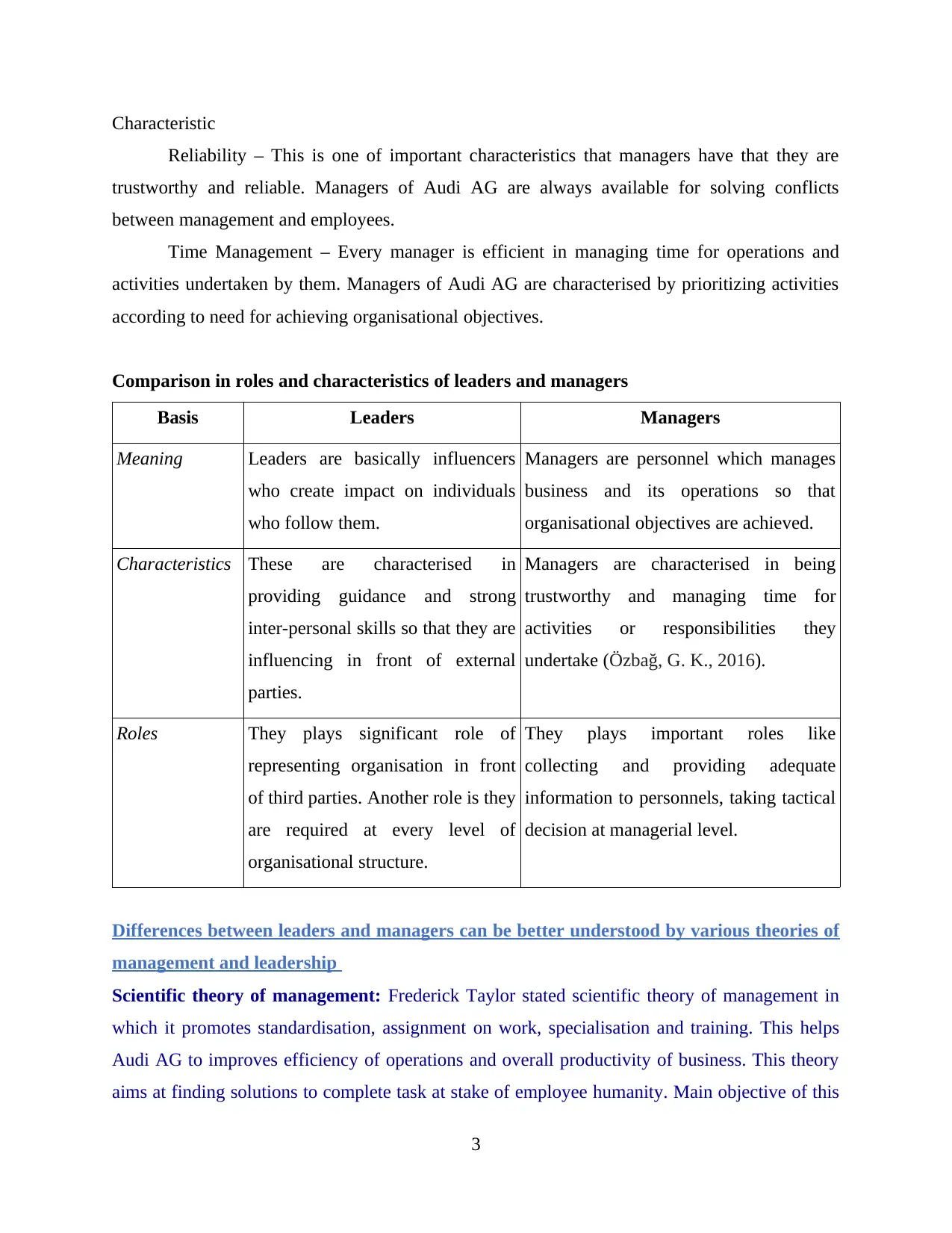
Characteristic
Reliability – This is one of important characteristics that managers have that they are
trustworthy and reliable. Managers of Audi AG are always available for solving conflicts
between management and employees.
Time Management – Every manager is efficient in managing time for operations and
activities undertaken by them. Managers of Audi AG are characterised by prioritizing activities
according to need for achieving organisational objectives.
Comparison in roles and characteristics of leaders and managers
Basis Leaders Managers
Meaning Leaders are basically influencers
who create impact on individuals
who follow them.
Managers are personnel which manages
business and its operations so that
organisational objectives are achieved.
Characteristics These are characterised in
providing guidance and strong
inter-personal skills so that they are
influencing in front of external
parties.
Managers are characterised in being
trustworthy and managing time for
activities or responsibilities they
undertake (Özbağ, G. K., 2016).
Roles They plays significant role of
representing organisation in front
of third parties. Another role is they
are required at every level of
organisational structure.
They plays important roles like
collecting and providing adequate
information to personnels, taking tactical
decision at managerial level.
Differences between leaders and managers can be better understood by various theories of
management and leadership
Scientific theory of management: Frederick Taylor stated scientific theory of management in
which it promotes standardisation, assignment on work, specialisation and training. This helps
Audi AG to improves efficiency of operations and overall productivity of business. This theory
aims at finding solutions to complete task at stake of employee humanity. Main objective of this
3
Reliability – This is one of important characteristics that managers have that they are
trustworthy and reliable. Managers of Audi AG are always available for solving conflicts
between management and employees.
Time Management – Every manager is efficient in managing time for operations and
activities undertaken by them. Managers of Audi AG are characterised by prioritizing activities
according to need for achieving organisational objectives.
Comparison in roles and characteristics of leaders and managers
Basis Leaders Managers
Meaning Leaders are basically influencers
who create impact on individuals
who follow them.
Managers are personnel which manages
business and its operations so that
organisational objectives are achieved.
Characteristics These are characterised in
providing guidance and strong
inter-personal skills so that they are
influencing in front of external
parties.
Managers are characterised in being
trustworthy and managing time for
activities or responsibilities they
undertake (Özbağ, G. K., 2016).
Roles They plays significant role of
representing organisation in front
of third parties. Another role is they
are required at every level of
organisational structure.
They plays important roles like
collecting and providing adequate
information to personnels, taking tactical
decision at managerial level.
Differences between leaders and managers can be better understood by various theories of
management and leadership
Scientific theory of management: Frederick Taylor stated scientific theory of management in
which it promotes standardisation, assignment on work, specialisation and training. This helps
Audi AG to improves efficiency of operations and overall productivity of business. This theory
aims at finding solutions to complete task at stake of employee humanity. Main objective of this
3
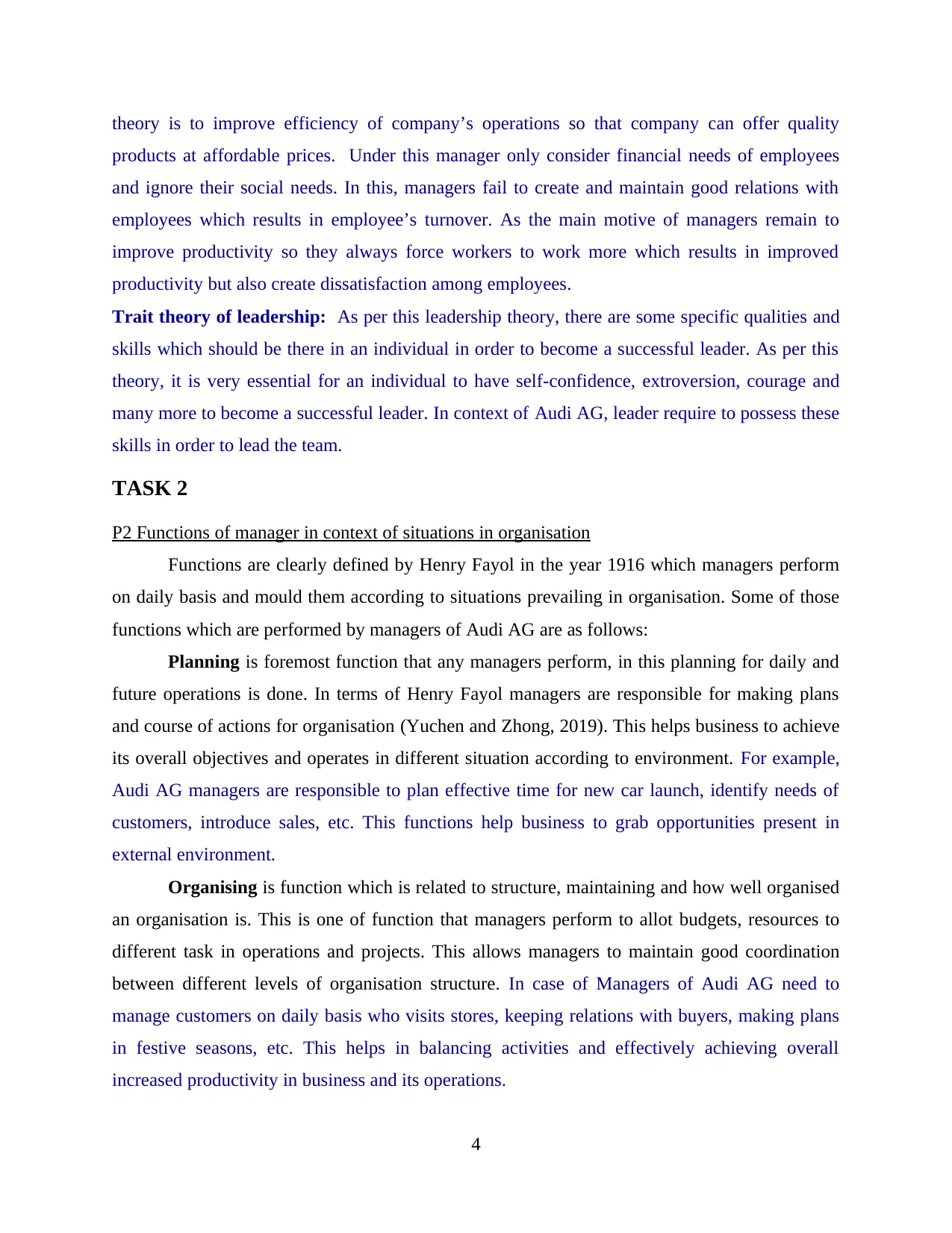
theory is to improve efficiency of company’s operations so that company can offer quality
products at affordable prices. Under this manager only consider financial needs of employees
and ignore their social needs. In this, managers fail to create and maintain good relations with
employees which results in employee’s turnover. As the main motive of managers remain to
improve productivity so they always force workers to work more which results in improved
productivity but also create dissatisfaction among employees.
Trait theory of leadership: As per this leadership theory, there are some specific qualities and
skills which should be there in an individual in order to become a successful leader. As per this
theory, it is very essential for an individual to have self-confidence, extroversion, courage and
many more to become a successful leader. In context of Audi AG, leader require to possess these
skills in order to lead the team.
TASK 2
P2 Functions of manager in context of situations in organisation
Functions are clearly defined by Henry Fayol in the year 1916 which managers perform
on daily basis and mould them according to situations prevailing in organisation. Some of those
functions which are performed by managers of Audi AG are as follows:
Planning is foremost function that any managers perform, in this planning for daily and
future operations is done. In terms of Henry Fayol managers are responsible for making plans
and course of actions for organisation (Yuchen and Zhong, 2019). This helps business to achieve
its overall objectives and operates in different situation according to environment. For example,
Audi AG managers are responsible to plan effective time for new car launch, identify needs of
customers, introduce sales, etc. This functions help business to grab opportunities present in
external environment.
Organising is function which is related to structure, maintaining and how well organised
an organisation is. This is one of function that managers perform to allot budgets, resources to
different task in operations and projects. This allows managers to maintain good coordination
between different levels of organisation structure. In case of Managers of Audi AG need to
manage customers on daily basis who visits stores, keeping relations with buyers, making plans
in festive seasons, etc. This helps in balancing activities and effectively achieving overall
increased productivity in business and its operations.
4
products at affordable prices. Under this manager only consider financial needs of employees
and ignore their social needs. In this, managers fail to create and maintain good relations with
employees which results in employee’s turnover. As the main motive of managers remain to
improve productivity so they always force workers to work more which results in improved
productivity but also create dissatisfaction among employees.
Trait theory of leadership: As per this leadership theory, there are some specific qualities and
skills which should be there in an individual in order to become a successful leader. As per this
theory, it is very essential for an individual to have self-confidence, extroversion, courage and
many more to become a successful leader. In context of Audi AG, leader require to possess these
skills in order to lead the team.
TASK 2
P2 Functions of manager in context of situations in organisation
Functions are clearly defined by Henry Fayol in the year 1916 which managers perform
on daily basis and mould them according to situations prevailing in organisation. Some of those
functions which are performed by managers of Audi AG are as follows:
Planning is foremost function that any managers perform, in this planning for daily and
future operations is done. In terms of Henry Fayol managers are responsible for making plans
and course of actions for organisation (Yuchen and Zhong, 2019). This helps business to achieve
its overall objectives and operates in different situation according to environment. For example,
Audi AG managers are responsible to plan effective time for new car launch, identify needs of
customers, introduce sales, etc. This functions help business to grab opportunities present in
external environment.
Organising is function which is related to structure, maintaining and how well organised
an organisation is. This is one of function that managers perform to allot budgets, resources to
different task in operations and projects. This allows managers to maintain good coordination
between different levels of organisation structure. In case of Managers of Audi AG need to
manage customers on daily basis who visits stores, keeping relations with buyers, making plans
in festive seasons, etc. This helps in balancing activities and effectively achieving overall
increased productivity in business and its operations.
4
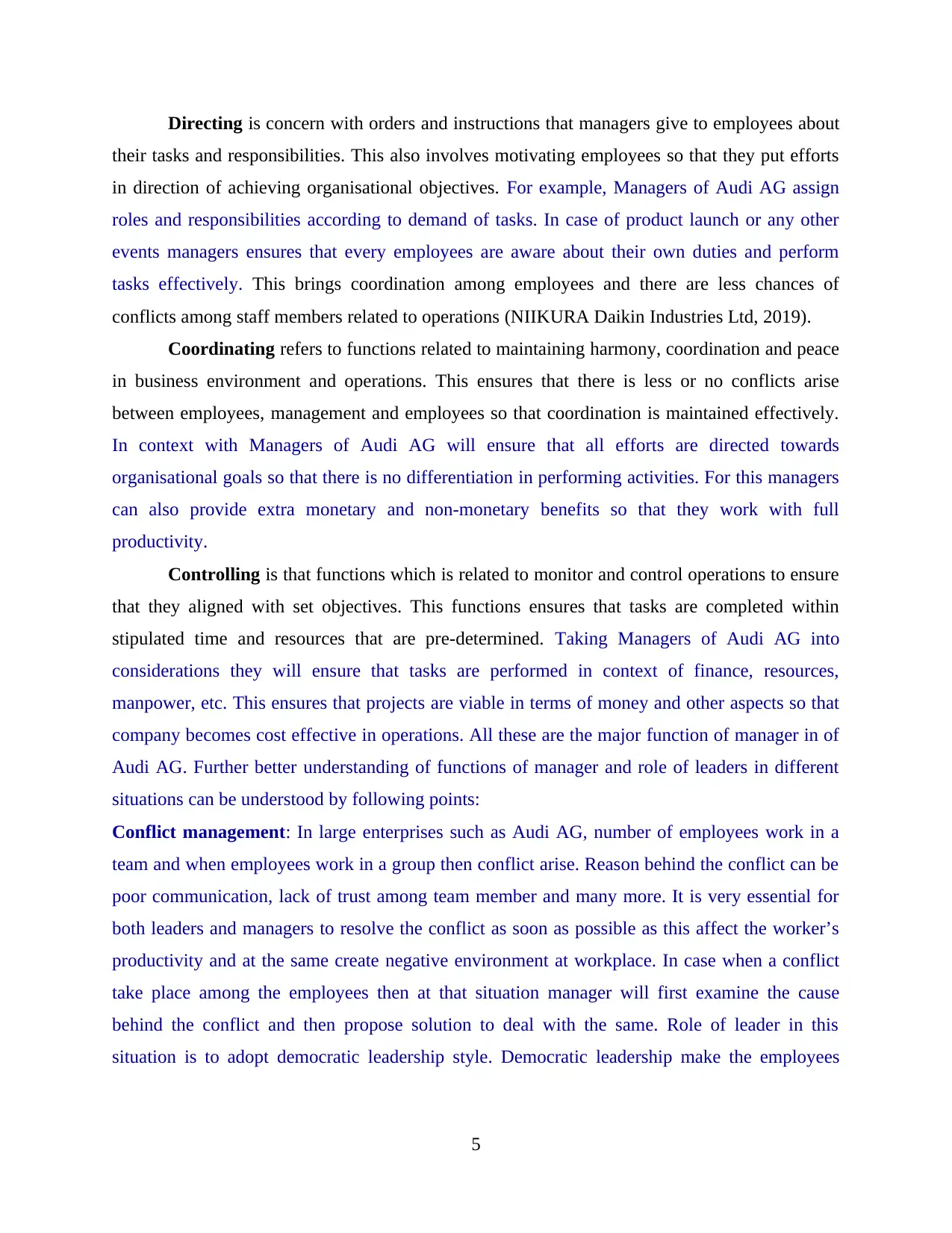
Directing is concern with orders and instructions that managers give to employees about
their tasks and responsibilities. This also involves motivating employees so that they put efforts
in direction of achieving organisational objectives. For example, Managers of Audi AG assign
roles and responsibilities according to demand of tasks. In case of product launch or any other
events managers ensures that every employees are aware about their own duties and perform
tasks effectively. This brings coordination among employees and there are less chances of
conflicts among staff members related to operations (NIIKURA Daikin Industries Ltd, 2019).
Coordinating refers to functions related to maintaining harmony, coordination and peace
in business environment and operations. This ensures that there is less or no conflicts arise
between employees, management and employees so that coordination is maintained effectively.
In context with Managers of Audi AG will ensure that all efforts are directed towards
organisational goals so that there is no differentiation in performing activities. For this managers
can also provide extra monetary and non-monetary benefits so that they work with full
productivity.
Controlling is that functions which is related to monitor and control operations to ensure
that they aligned with set objectives. This functions ensures that tasks are completed within
stipulated time and resources that are pre-determined. Taking Managers of Audi AG into
considerations they will ensure that tasks are performed in context of finance, resources,
manpower, etc. This ensures that projects are viable in terms of money and other aspects so that
company becomes cost effective in operations. All these are the major function of manager in of
Audi AG. Further better understanding of functions of manager and role of leaders in different
situations can be understood by following points:
Conflict management: In large enterprises such as Audi AG, number of employees work in a
team and when employees work in a group then conflict arise. Reason behind the conflict can be
poor communication, lack of trust among team member and many more. It is very essential for
both leaders and managers to resolve the conflict as soon as possible as this affect the worker’s
productivity and at the same create negative environment at workplace. In case when a conflict
take place among the employees then at that situation manager will first examine the cause
behind the conflict and then propose solution to deal with the same. Role of leader in this
situation is to adopt democratic leadership style. Democratic leadership make the employees
5
their tasks and responsibilities. This also involves motivating employees so that they put efforts
in direction of achieving organisational objectives. For example, Managers of Audi AG assign
roles and responsibilities according to demand of tasks. In case of product launch or any other
events managers ensures that every employees are aware about their own duties and perform
tasks effectively. This brings coordination among employees and there are less chances of
conflicts among staff members related to operations (NIIKURA Daikin Industries Ltd, 2019).
Coordinating refers to functions related to maintaining harmony, coordination and peace
in business environment and operations. This ensures that there is less or no conflicts arise
between employees, management and employees so that coordination is maintained effectively.
In context with Managers of Audi AG will ensure that all efforts are directed towards
organisational goals so that there is no differentiation in performing activities. For this managers
can also provide extra monetary and non-monetary benefits so that they work with full
productivity.
Controlling is that functions which is related to monitor and control operations to ensure
that they aligned with set objectives. This functions ensures that tasks are completed within
stipulated time and resources that are pre-determined. Taking Managers of Audi AG into
considerations they will ensure that tasks are performed in context of finance, resources,
manpower, etc. This ensures that projects are viable in terms of money and other aspects so that
company becomes cost effective in operations. All these are the major function of manager in of
Audi AG. Further better understanding of functions of manager and role of leaders in different
situations can be understood by following points:
Conflict management: In large enterprises such as Audi AG, number of employees work in a
team and when employees work in a group then conflict arise. Reason behind the conflict can be
poor communication, lack of trust among team member and many more. It is very essential for
both leaders and managers to resolve the conflict as soon as possible as this affect the worker’s
productivity and at the same create negative environment at workplace. In case when a conflict
take place among the employees then at that situation manager will first examine the cause
behind the conflict and then propose solution to deal with the same. Role of leader in this
situation is to adopt democratic leadership style. Democratic leadership make the employees
5
Paraphrase This Document
Need a fresh take? Get an instant paraphrase of this document with our AI Paraphraser
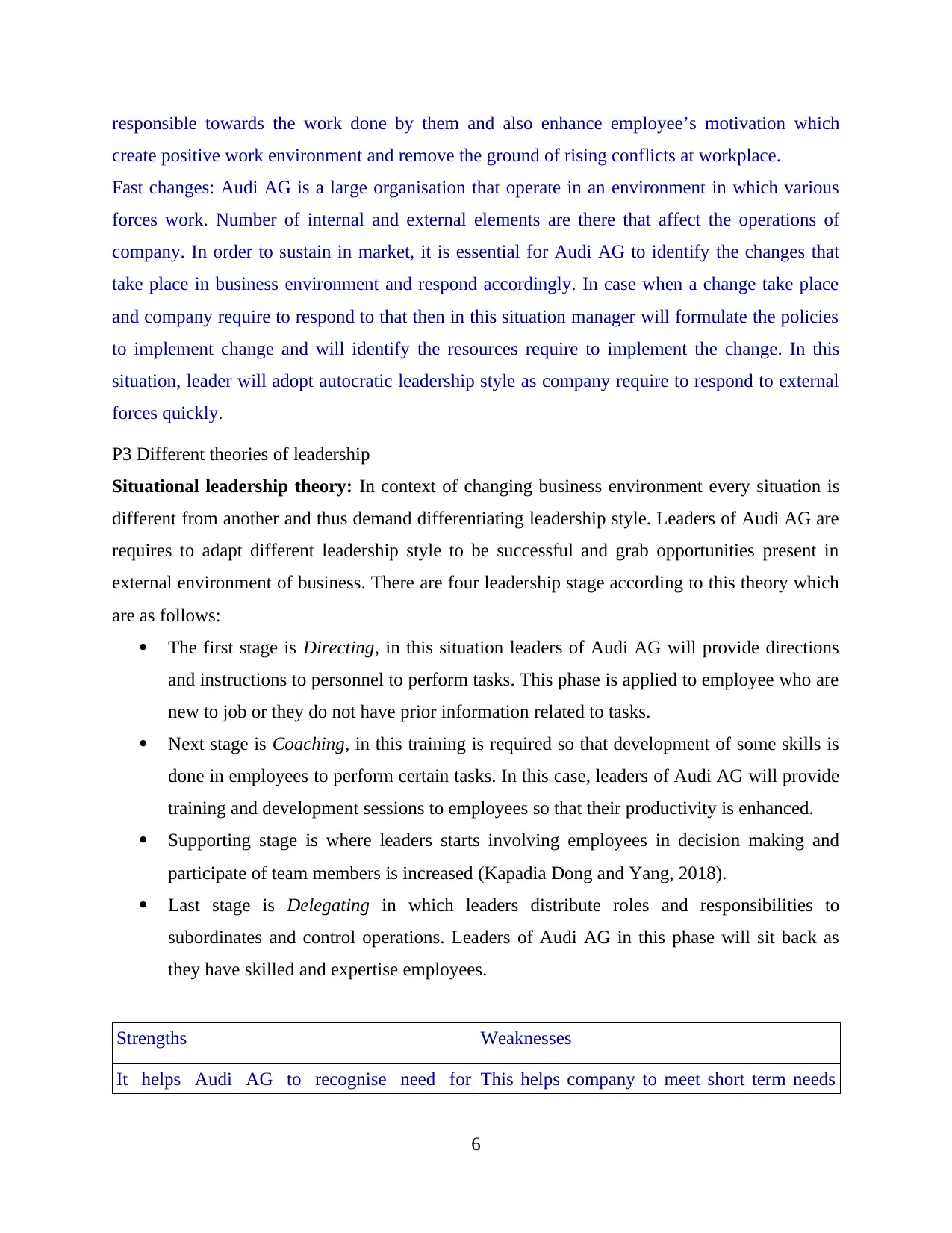
responsible towards the work done by them and also enhance employee’s motivation which
create positive work environment and remove the ground of rising conflicts at workplace.
Fast changes: Audi AG is a large organisation that operate in an environment in which various
forces work. Number of internal and external elements are there that affect the operations of
company. In order to sustain in market, it is essential for Audi AG to identify the changes that
take place in business environment and respond accordingly. In case when a change take place
and company require to respond to that then in this situation manager will formulate the policies
to implement change and will identify the resources require to implement the change. In this
situation, leader will adopt autocratic leadership style as company require to respond to external
forces quickly.
P3 Different theories of leadership
Situational leadership theory: In context of changing business environment every situation is
different from another and thus demand differentiating leadership style. Leaders of Audi AG are
requires to adapt different leadership style to be successful and grab opportunities present in
external environment of business. There are four leadership stage according to this theory which
are as follows:
The first stage is Directing, in this situation leaders of Audi AG will provide directions
and instructions to personnel to perform tasks. This phase is applied to employee who are
new to job or they do not have prior information related to tasks.
Next stage is Coaching, in this training is required so that development of some skills is
done in employees to perform certain tasks. In this case, leaders of Audi AG will provide
training and development sessions to employees so that their productivity is enhanced.
Supporting stage is where leaders starts involving employees in decision making and
participate of team members is increased (Kapadia Dong and Yang, 2018).
Last stage is Delegating in which leaders distribute roles and responsibilities to
subordinates and control operations. Leaders of Audi AG in this phase will sit back as
they have skilled and expertise employees.
Strengths Weaknesses
It helps Audi AG to recognise need for This helps company to meet short term needs
6
create positive work environment and remove the ground of rising conflicts at workplace.
Fast changes: Audi AG is a large organisation that operate in an environment in which various
forces work. Number of internal and external elements are there that affect the operations of
company. In order to sustain in market, it is essential for Audi AG to identify the changes that
take place in business environment and respond accordingly. In case when a change take place
and company require to respond to that then in this situation manager will formulate the policies
to implement change and will identify the resources require to implement the change. In this
situation, leader will adopt autocratic leadership style as company require to respond to external
forces quickly.
P3 Different theories of leadership
Situational leadership theory: In context of changing business environment every situation is
different from another and thus demand differentiating leadership style. Leaders of Audi AG are
requires to adapt different leadership style to be successful and grab opportunities present in
external environment of business. There are four leadership stage according to this theory which
are as follows:
The first stage is Directing, in this situation leaders of Audi AG will provide directions
and instructions to personnel to perform tasks. This phase is applied to employee who are
new to job or they do not have prior information related to tasks.
Next stage is Coaching, in this training is required so that development of some skills is
done in employees to perform certain tasks. In this case, leaders of Audi AG will provide
training and development sessions to employees so that their productivity is enhanced.
Supporting stage is where leaders starts involving employees in decision making and
participate of team members is increased (Kapadia Dong and Yang, 2018).
Last stage is Delegating in which leaders distribute roles and responsibilities to
subordinates and control operations. Leaders of Audi AG in this phase will sit back as
they have skilled and expertise employees.
Strengths Weaknesses
It helps Audi AG to recognise need for This helps company to meet short term needs
6
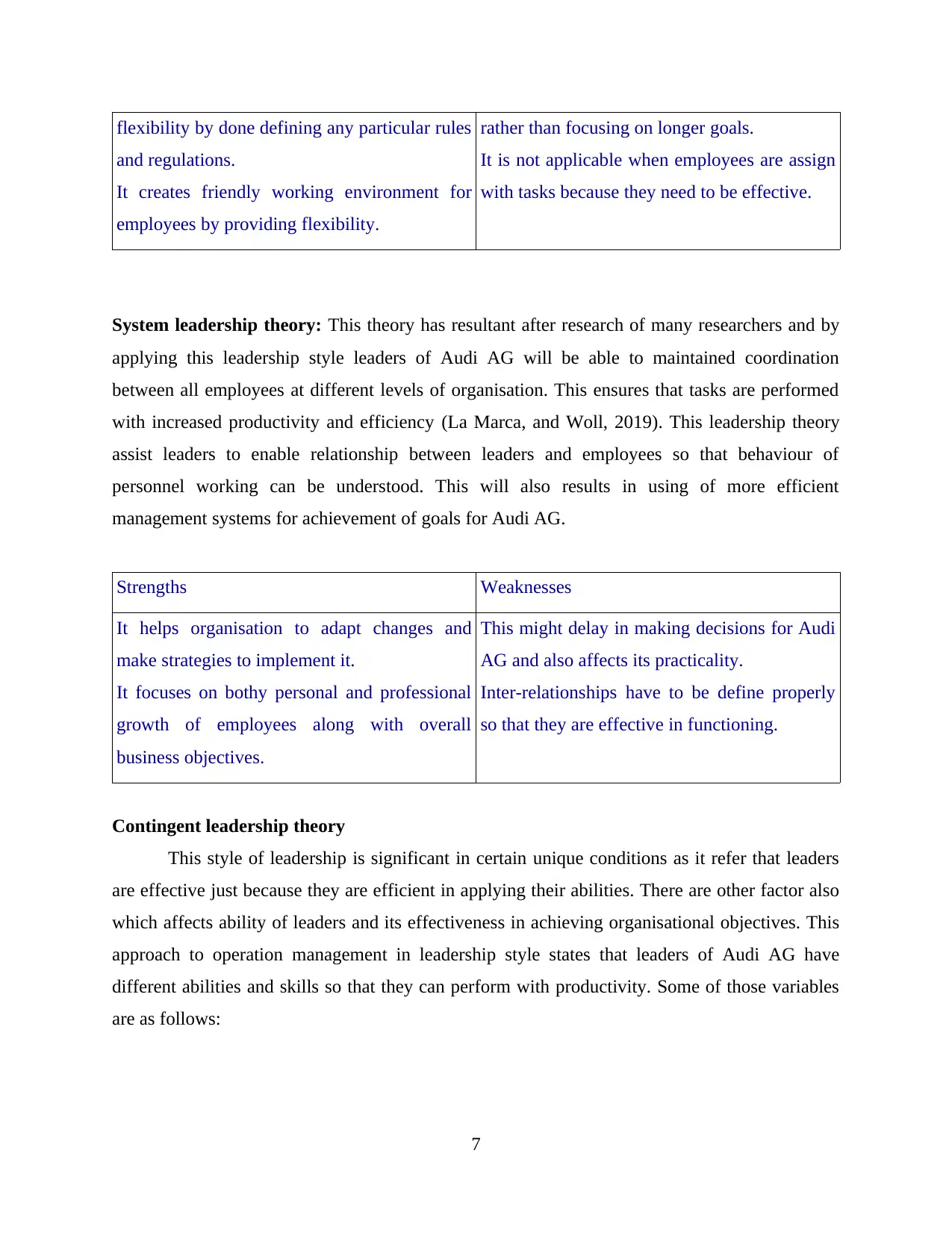
flexibility by done defining any particular rules
and regulations.
It creates friendly working environment for
employees by providing flexibility.
rather than focusing on longer goals.
It is not applicable when employees are assign
with tasks because they need to be effective.
System leadership theory: This theory has resultant after research of many researchers and by
applying this leadership style leaders of Audi AG will be able to maintained coordination
between all employees at different levels of organisation. This ensures that tasks are performed
with increased productivity and efficiency (La Marca, and Woll, 2019). This leadership theory
assist leaders to enable relationship between leaders and employees so that behaviour of
personnel working can be understood. This will also results in using of more efficient
management systems for achievement of goals for Audi AG.
Strengths Weaknesses
It helps organisation to adapt changes and
make strategies to implement it.
It focuses on bothy personal and professional
growth of employees along with overall
business objectives.
This might delay in making decisions for Audi
AG and also affects its practicality.
Inter-relationships have to be define properly
so that they are effective in functioning.
Contingent leadership theory
This style of leadership is significant in certain unique conditions as it refer that leaders
are effective just because they are efficient in applying their abilities. There are other factor also
which affects ability of leaders and its effectiveness in achieving organisational objectives. This
approach to operation management in leadership style states that leaders of Audi AG have
different abilities and skills so that they can perform with productivity. Some of those variables
are as follows:
7
and regulations.
It creates friendly working environment for
employees by providing flexibility.
rather than focusing on longer goals.
It is not applicable when employees are assign
with tasks because they need to be effective.
System leadership theory: This theory has resultant after research of many researchers and by
applying this leadership style leaders of Audi AG will be able to maintained coordination
between all employees at different levels of organisation. This ensures that tasks are performed
with increased productivity and efficiency (La Marca, and Woll, 2019). This leadership theory
assist leaders to enable relationship between leaders and employees so that behaviour of
personnel working can be understood. This will also results in using of more efficient
management systems for achievement of goals for Audi AG.
Strengths Weaknesses
It helps organisation to adapt changes and
make strategies to implement it.
It focuses on bothy personal and professional
growth of employees along with overall
business objectives.
This might delay in making decisions for Audi
AG and also affects its practicality.
Inter-relationships have to be define properly
so that they are effective in functioning.
Contingent leadership theory
This style of leadership is significant in certain unique conditions as it refer that leaders
are effective just because they are efficient in applying their abilities. There are other factor also
which affects ability of leaders and its effectiveness in achieving organisational objectives. This
approach to operation management in leadership style states that leaders of Audi AG have
different abilities and skills so that they can perform with productivity. Some of those variables
are as follows:
7
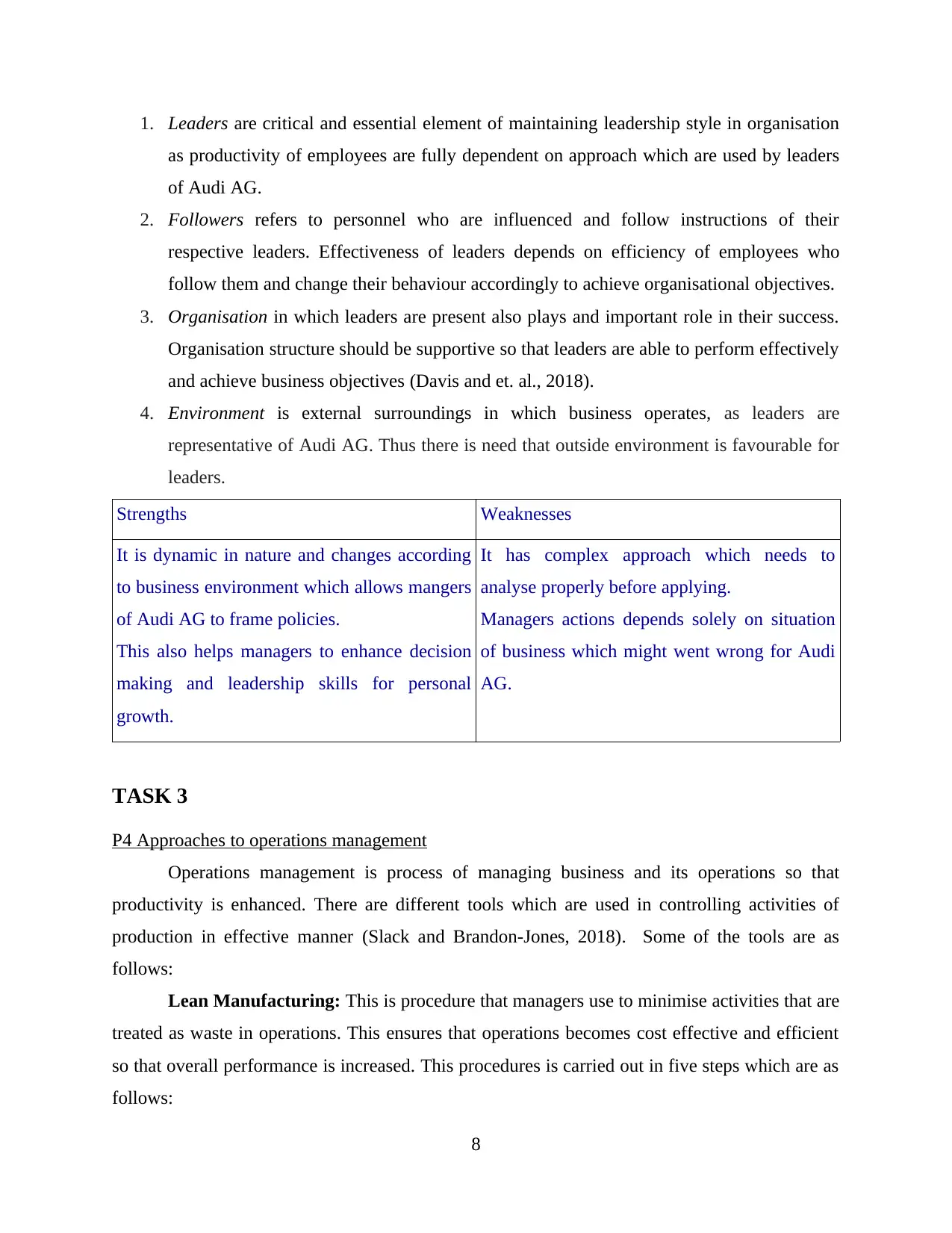
1. Leaders are critical and essential element of maintaining leadership style in organisation
as productivity of employees are fully dependent on approach which are used by leaders
of Audi AG.
2. Followers refers to personnel who are influenced and follow instructions of their
respective leaders. Effectiveness of leaders depends on efficiency of employees who
follow them and change their behaviour accordingly to achieve organisational objectives.
3. Organisation in which leaders are present also plays and important role in their success.
Organisation structure should be supportive so that leaders are able to perform effectively
and achieve business objectives (Davis and et. al., 2018).
4. Environment is external surroundings in which business operates, as leaders are
representative of Audi AG. Thus there is need that outside environment is favourable for
leaders.
Strengths Weaknesses
It is dynamic in nature and changes according
to business environment which allows mangers
of Audi AG to frame policies.
This also helps managers to enhance decision
making and leadership skills for personal
growth.
It has complex approach which needs to
analyse properly before applying.
Managers actions depends solely on situation
of business which might went wrong for Audi
AG.
TASK 3
P4 Approaches to operations management
Operations management is process of managing business and its operations so that
productivity is enhanced. There are different tools which are used in controlling activities of
production in effective manner (Slack and Brandon-Jones, 2018). Some of the tools are as
follows:
Lean Manufacturing: This is procedure that managers use to minimise activities that are
treated as waste in operations. This ensures that operations becomes cost effective and efficient
so that overall performance is increased. This procedures is carried out in five steps which are as
follows:
8
as productivity of employees are fully dependent on approach which are used by leaders
of Audi AG.
2. Followers refers to personnel who are influenced and follow instructions of their
respective leaders. Effectiveness of leaders depends on efficiency of employees who
follow them and change their behaviour accordingly to achieve organisational objectives.
3. Organisation in which leaders are present also plays and important role in their success.
Organisation structure should be supportive so that leaders are able to perform effectively
and achieve business objectives (Davis and et. al., 2018).
4. Environment is external surroundings in which business operates, as leaders are
representative of Audi AG. Thus there is need that outside environment is favourable for
leaders.
Strengths Weaknesses
It is dynamic in nature and changes according
to business environment which allows mangers
of Audi AG to frame policies.
This also helps managers to enhance decision
making and leadership skills for personal
growth.
It has complex approach which needs to
analyse properly before applying.
Managers actions depends solely on situation
of business which might went wrong for Audi
AG.
TASK 3
P4 Approaches to operations management
Operations management is process of managing business and its operations so that
productivity is enhanced. There are different tools which are used in controlling activities of
production in effective manner (Slack and Brandon-Jones, 2018). Some of the tools are as
follows:
Lean Manufacturing: This is procedure that managers use to minimise activities that are
treated as waste in operations. This ensures that operations becomes cost effective and efficient
so that overall performance is increased. This procedures is carried out in five steps which are as
follows:
8
Secure Best Marks with AI Grader
Need help grading? Try our AI Grader for instant feedback on your assignments.
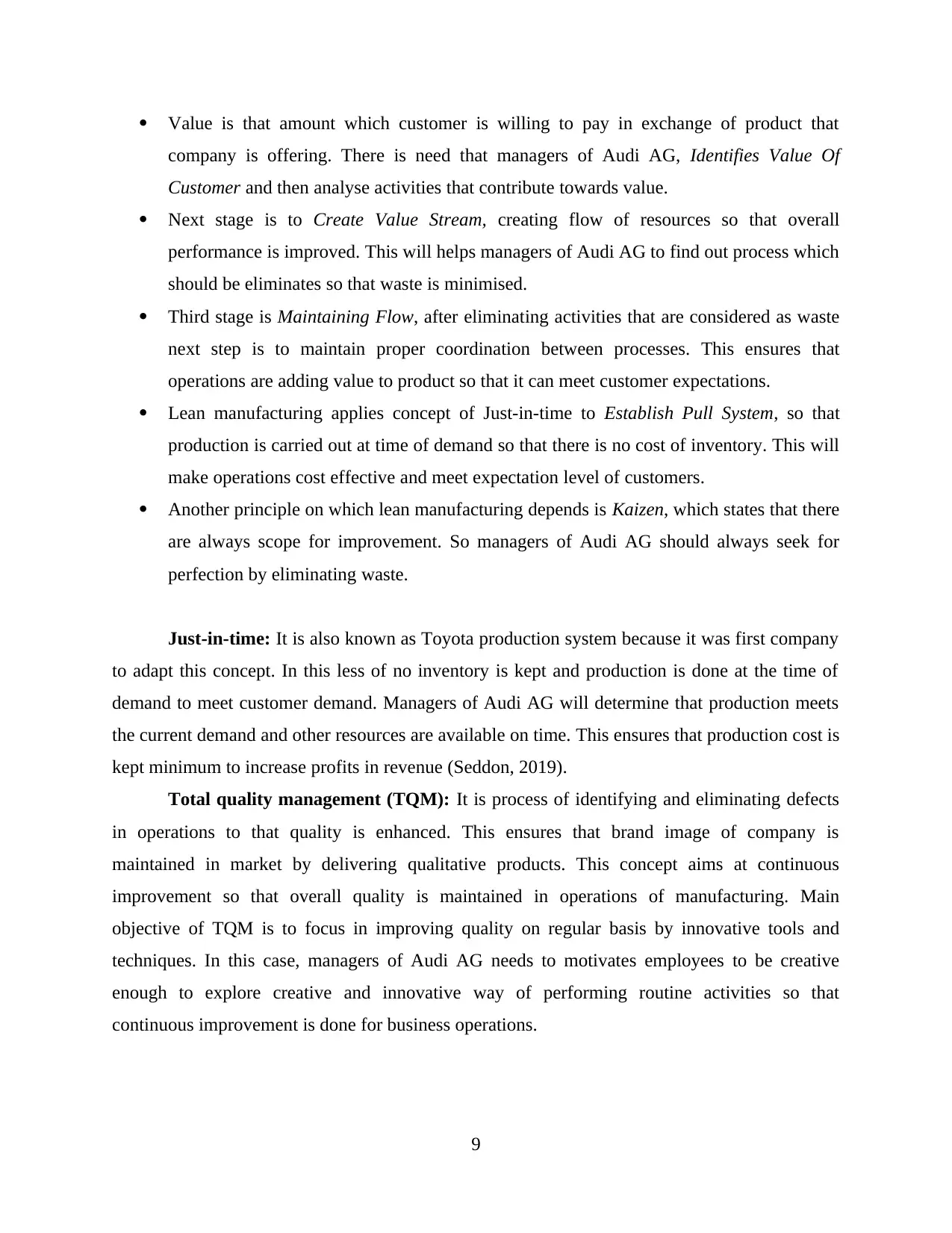
Value is that amount which customer is willing to pay in exchange of product that
company is offering. There is need that managers of Audi AG, Identifies Value Of
Customer and then analyse activities that contribute towards value.
Next stage is to Create Value Stream, creating flow of resources so that overall
performance is improved. This will helps managers of Audi AG to find out process which
should be eliminates so that waste is minimised.
Third stage is Maintaining Flow, after eliminating activities that are considered as waste
next step is to maintain proper coordination between processes. This ensures that
operations are adding value to product so that it can meet customer expectations.
Lean manufacturing applies concept of Just-in-time to Establish Pull System, so that
production is carried out at time of demand so that there is no cost of inventory. This will
make operations cost effective and meet expectation level of customers.
Another principle on which lean manufacturing depends is Kaizen, which states that there
are always scope for improvement. So managers of Audi AG should always seek for
perfection by eliminating waste.
Just-in-time: It is also known as Toyota production system because it was first company
to adapt this concept. In this less of no inventory is kept and production is done at the time of
demand to meet customer demand. Managers of Audi AG will determine that production meets
the current demand and other resources are available on time. This ensures that production cost is
kept minimum to increase profits in revenue (Seddon, 2019).
Total quality management (TQM): It is process of identifying and eliminating defects
in operations to that quality is enhanced. This ensures that brand image of company is
maintained in market by delivering qualitative products. This concept aims at continuous
improvement so that overall quality is maintained in operations of manufacturing. Main
objective of TQM is to focus in improving quality on regular basis by innovative tools and
techniques. In this case, managers of Audi AG needs to motivates employees to be creative
enough to explore creative and innovative way of performing routine activities so that
continuous improvement is done for business operations.
9
company is offering. There is need that managers of Audi AG, Identifies Value Of
Customer and then analyse activities that contribute towards value.
Next stage is to Create Value Stream, creating flow of resources so that overall
performance is improved. This will helps managers of Audi AG to find out process which
should be eliminates so that waste is minimised.
Third stage is Maintaining Flow, after eliminating activities that are considered as waste
next step is to maintain proper coordination between processes. This ensures that
operations are adding value to product so that it can meet customer expectations.
Lean manufacturing applies concept of Just-in-time to Establish Pull System, so that
production is carried out at time of demand so that there is no cost of inventory. This will
make operations cost effective and meet expectation level of customers.
Another principle on which lean manufacturing depends is Kaizen, which states that there
are always scope for improvement. So managers of Audi AG should always seek for
perfection by eliminating waste.
Just-in-time: It is also known as Toyota production system because it was first company
to adapt this concept. In this less of no inventory is kept and production is done at the time of
demand to meet customer demand. Managers of Audi AG will determine that production meets
the current demand and other resources are available on time. This ensures that production cost is
kept minimum to increase profits in revenue (Seddon, 2019).
Total quality management (TQM): It is process of identifying and eliminating defects
in operations to that quality is enhanced. This ensures that brand image of company is
maintained in market by delivering qualitative products. This concept aims at continuous
improvement so that overall quality is maintained in operations of manufacturing. Main
objective of TQM is to focus in improving quality on regular basis by innovative tools and
techniques. In this case, managers of Audi AG needs to motivates employees to be creative
enough to explore creative and innovative way of performing routine activities so that
continuous improvement is done for business operations.
9
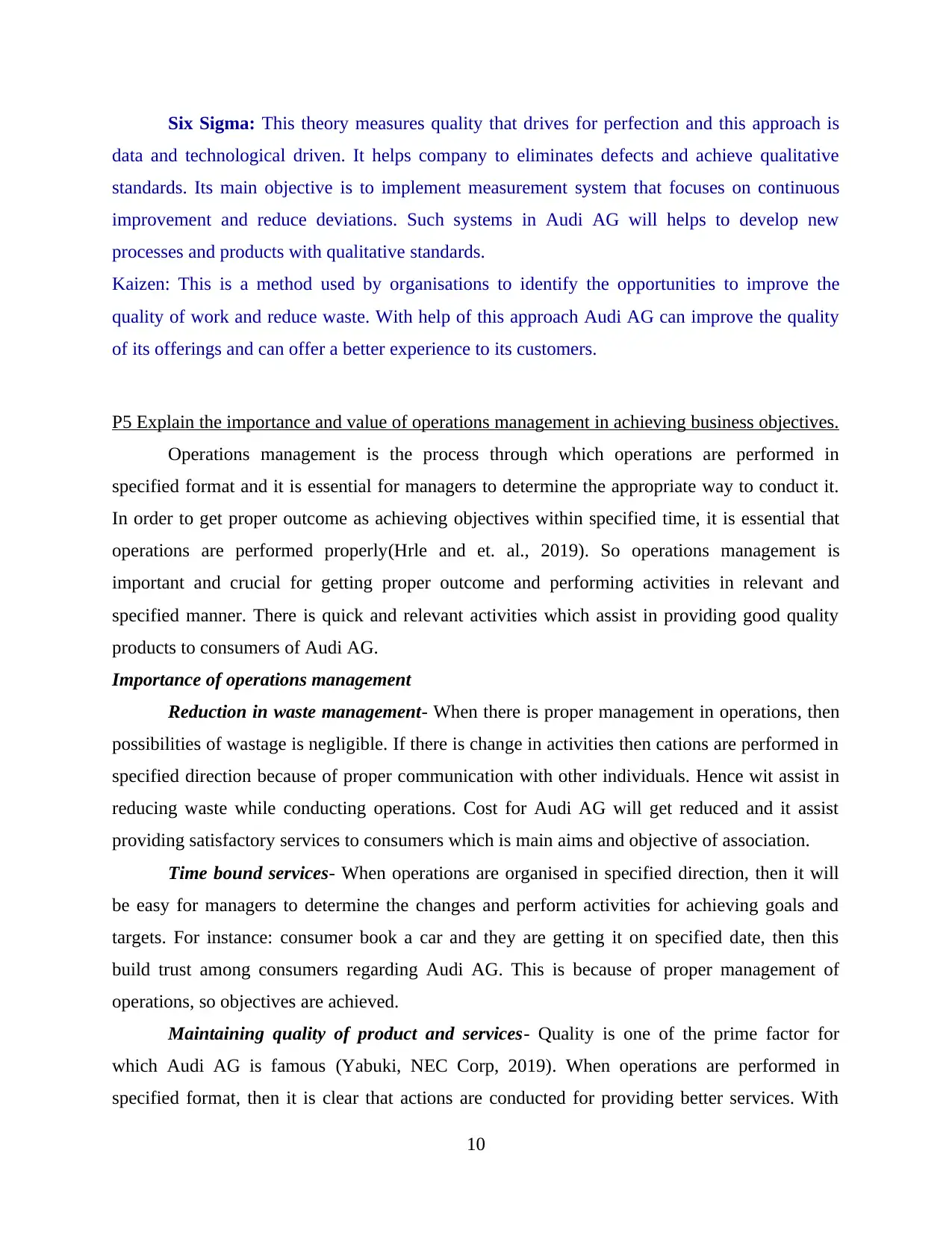
Six Sigma: This theory measures quality that drives for perfection and this approach is
data and technological driven. It helps company to eliminates defects and achieve qualitative
standards. Its main objective is to implement measurement system that focuses on continuous
improvement and reduce deviations. Such systems in Audi AG will helps to develop new
processes and products with qualitative standards.
Kaizen: This is a method used by organisations to identify the opportunities to improve the
quality of work and reduce waste. With help of this approach Audi AG can improve the quality
of its offerings and can offer a better experience to its customers.
P5 Explain the importance and value of operations management in achieving business objectives.
Operations management is the process through which operations are performed in
specified format and it is essential for managers to determine the appropriate way to conduct it.
In order to get proper outcome as achieving objectives within specified time, it is essential that
operations are performed properly(Hrle and et. al., 2019). So operations management is
important and crucial for getting proper outcome and performing activities in relevant and
specified manner. There is quick and relevant activities which assist in providing good quality
products to consumers of Audi AG.
Importance of operations management
Reduction in waste management- When there is proper management in operations, then
possibilities of wastage is negligible. If there is change in activities then cations are performed in
specified direction because of proper communication with other individuals. Hence wit assist in
reducing waste while conducting operations. Cost for Audi AG will get reduced and it assist
providing satisfactory services to consumers which is main aims and objective of association.
Time bound services- When operations are organised in specified direction, then it will
be easy for managers to determine the changes and perform activities for achieving goals and
targets. For instance: consumer book a car and they are getting it on specified date, then this
build trust among consumers regarding Audi AG. This is because of proper management of
operations, so objectives are achieved.
Maintaining quality of product and services- Quality is one of the prime factor for
which Audi AG is famous (Yabuki, NEC Corp, 2019). When operations are performed in
specified format, then it is clear that actions are conducted for providing better services. With
10
data and technological driven. It helps company to eliminates defects and achieve qualitative
standards. Its main objective is to implement measurement system that focuses on continuous
improvement and reduce deviations. Such systems in Audi AG will helps to develop new
processes and products with qualitative standards.
Kaizen: This is a method used by organisations to identify the opportunities to improve the
quality of work and reduce waste. With help of this approach Audi AG can improve the quality
of its offerings and can offer a better experience to its customers.
P5 Explain the importance and value of operations management in achieving business objectives.
Operations management is the process through which operations are performed in
specified format and it is essential for managers to determine the appropriate way to conduct it.
In order to get proper outcome as achieving objectives within specified time, it is essential that
operations are performed properly(Hrle and et. al., 2019). So operations management is
important and crucial for getting proper outcome and performing activities in relevant and
specified manner. There is quick and relevant activities which assist in providing good quality
products to consumers of Audi AG.
Importance of operations management
Reduction in waste management- When there is proper management in operations, then
possibilities of wastage is negligible. If there is change in activities then cations are performed in
specified direction because of proper communication with other individuals. Hence wit assist in
reducing waste while conducting operations. Cost for Audi AG will get reduced and it assist
providing satisfactory services to consumers which is main aims and objective of association.
Time bound services- When operations are organised in specified direction, then it will
be easy for managers to determine the changes and perform activities for achieving goals and
targets. For instance: consumer book a car and they are getting it on specified date, then this
build trust among consumers regarding Audi AG. This is because of proper management of
operations, so objectives are achieved.
Maintaining quality of product and services- Quality is one of the prime factor for
which Audi AG is famous (Yabuki, NEC Corp, 2019). When operations are performed in
specified format, then it is clear that actions are conducted for providing better services. With
10
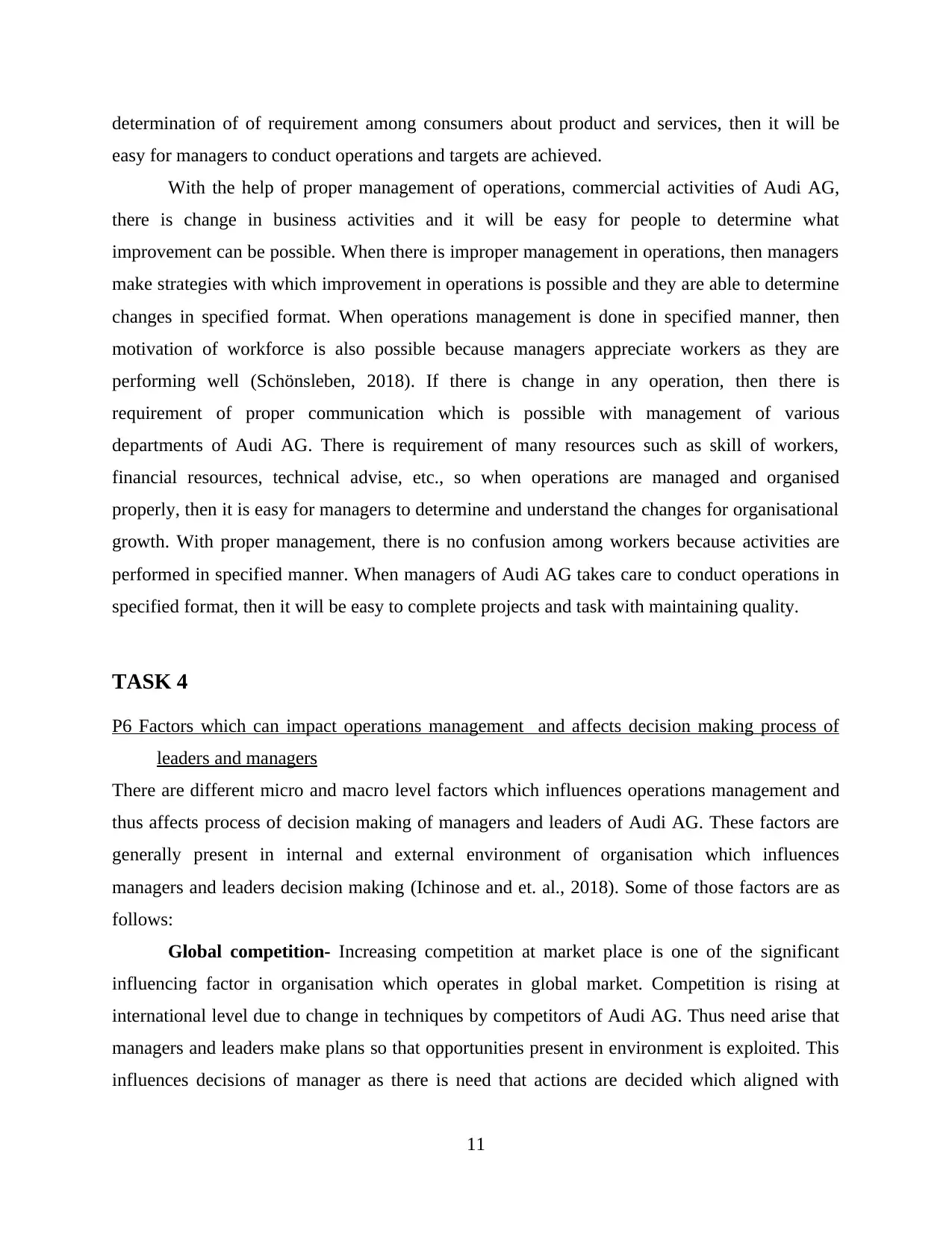
determination of of requirement among consumers about product and services, then it will be
easy for managers to conduct operations and targets are achieved.
With the help of proper management of operations, commercial activities of Audi AG,
there is change in business activities and it will be easy for people to determine what
improvement can be possible. When there is improper management in operations, then managers
make strategies with which improvement in operations is possible and they are able to determine
changes in specified format. When operations management is done in specified manner, then
motivation of workforce is also possible because managers appreciate workers as they are
performing well (Schönsleben, 2018). If there is change in any operation, then there is
requirement of proper communication which is possible with management of various
departments of Audi AG. There is requirement of many resources such as skill of workers,
financial resources, technical advise, etc., so when operations are managed and organised
properly, then it is easy for managers to determine and understand the changes for organisational
growth. With proper management, there is no confusion among workers because activities are
performed in specified manner. When managers of Audi AG takes care to conduct operations in
specified format, then it will be easy to complete projects and task with maintaining quality.
TASK 4
P6 Factors which can impact operations management and affects decision making process of
leaders and managers
There are different micro and macro level factors which influences operations management and
thus affects process of decision making of managers and leaders of Audi AG. These factors are
generally present in internal and external environment of organisation which influences
managers and leaders decision making (Ichinose and et. al., 2018). Some of those factors are as
follows:
Global competition- Increasing competition at market place is one of the significant
influencing factor in organisation which operates in global market. Competition is rising at
international level due to change in techniques by competitors of Audi AG. Thus need arise that
managers and leaders make plans so that opportunities present in environment is exploited. This
influences decisions of manager as there is need that actions are decided which aligned with
11
easy for managers to conduct operations and targets are achieved.
With the help of proper management of operations, commercial activities of Audi AG,
there is change in business activities and it will be easy for people to determine what
improvement can be possible. When there is improper management in operations, then managers
make strategies with which improvement in operations is possible and they are able to determine
changes in specified format. When operations management is done in specified manner, then
motivation of workforce is also possible because managers appreciate workers as they are
performing well (Schönsleben, 2018). If there is change in any operation, then there is
requirement of proper communication which is possible with management of various
departments of Audi AG. There is requirement of many resources such as skill of workers,
financial resources, technical advise, etc., so when operations are managed and organised
properly, then it is easy for managers to determine and understand the changes for organisational
growth. With proper management, there is no confusion among workers because activities are
performed in specified manner. When managers of Audi AG takes care to conduct operations in
specified format, then it will be easy to complete projects and task with maintaining quality.
TASK 4
P6 Factors which can impact operations management and affects decision making process of
leaders and managers
There are different micro and macro level factors which influences operations management and
thus affects process of decision making of managers and leaders of Audi AG. These factors are
generally present in internal and external environment of organisation which influences
managers and leaders decision making (Ichinose and et. al., 2018). Some of those factors are as
follows:
Global competition- Increasing competition at market place is one of the significant
influencing factor in organisation which operates in global market. Competition is rising at
international level due to change in techniques by competitors of Audi AG. Thus need arise that
managers and leaders make plans so that opportunities present in environment is exploited. This
influences decisions of manager as there is need that actions are decided which aligned with
11
Paraphrase This Document
Need a fresh take? Get an instant paraphrase of this document with our AI Paraphraser
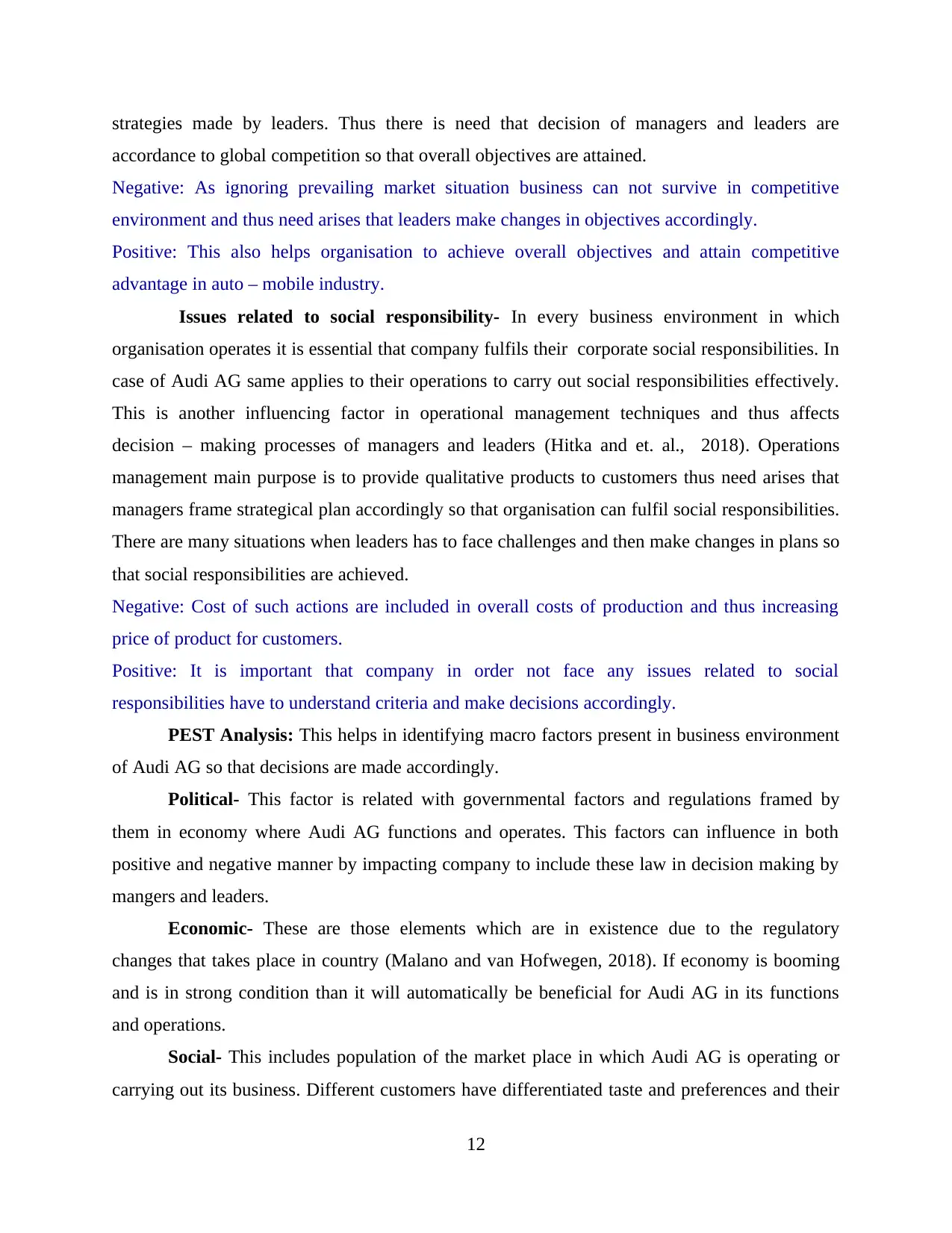
strategies made by leaders. Thus there is need that decision of managers and leaders are
accordance to global competition so that overall objectives are attained.
Negative: As ignoring prevailing market situation business can not survive in competitive
environment and thus need arises that leaders make changes in objectives accordingly.
Positive: This also helps organisation to achieve overall objectives and attain competitive
advantage in auto – mobile industry.
Issues related to social responsibility- In every business environment in which
organisation operates it is essential that company fulfils their corporate social responsibilities. In
case of Audi AG same applies to their operations to carry out social responsibilities effectively.
This is another influencing factor in operational management techniques and thus affects
decision – making processes of managers and leaders (Hitka and et. al., 2018). Operations
management main purpose is to provide qualitative products to customers thus need arises that
managers frame strategical plan accordingly so that organisation can fulfil social responsibilities.
There are many situations when leaders has to face challenges and then make changes in plans so
that social responsibilities are achieved.
Negative: Cost of such actions are included in overall costs of production and thus increasing
price of product for customers.
Positive: It is important that company in order not face any issues related to social
responsibilities have to understand criteria and make decisions accordingly.
PEST Analysis: This helps in identifying macro factors present in business environment
of Audi AG so that decisions are made accordingly.
Political- This factor is related with governmental factors and regulations framed by
them in economy where Audi AG functions and operates. This factors can influence in both
positive and negative manner by impacting company to include these law in decision making by
mangers and leaders.
Economic- These are those elements which are in existence due to the regulatory
changes that takes place in country (Malano and van Hofwegen, 2018). If economy is booming
and is in strong condition than it will automatically be beneficial for Audi AG in its functions
and operations.
Social- This includes population of the market place in which Audi AG is operating or
carrying out its business. Different customers have differentiated taste and preferences and their
12
accordance to global competition so that overall objectives are attained.
Negative: As ignoring prevailing market situation business can not survive in competitive
environment and thus need arises that leaders make changes in objectives accordingly.
Positive: This also helps organisation to achieve overall objectives and attain competitive
advantage in auto – mobile industry.
Issues related to social responsibility- In every business environment in which
organisation operates it is essential that company fulfils their corporate social responsibilities. In
case of Audi AG same applies to their operations to carry out social responsibilities effectively.
This is another influencing factor in operational management techniques and thus affects
decision – making processes of managers and leaders (Hitka and et. al., 2018). Operations
management main purpose is to provide qualitative products to customers thus need arises that
managers frame strategical plan accordingly so that organisation can fulfil social responsibilities.
There are many situations when leaders has to face challenges and then make changes in plans so
that social responsibilities are achieved.
Negative: Cost of such actions are included in overall costs of production and thus increasing
price of product for customers.
Positive: It is important that company in order not face any issues related to social
responsibilities have to understand criteria and make decisions accordingly.
PEST Analysis: This helps in identifying macro factors present in business environment
of Audi AG so that decisions are made accordingly.
Political- This factor is related with governmental factors and regulations framed by
them in economy where Audi AG functions and operates. This factors can influence in both
positive and negative manner by impacting company to include these law in decision making by
mangers and leaders.
Economic- These are those elements which are in existence due to the regulatory
changes that takes place in country (Malano and van Hofwegen, 2018). If economy is booming
and is in strong condition than it will automatically be beneficial for Audi AG in its functions
and operations.
Social- This includes population of the market place in which Audi AG is operating or
carrying out its business. Different customers have differentiated taste and preferences and their
12
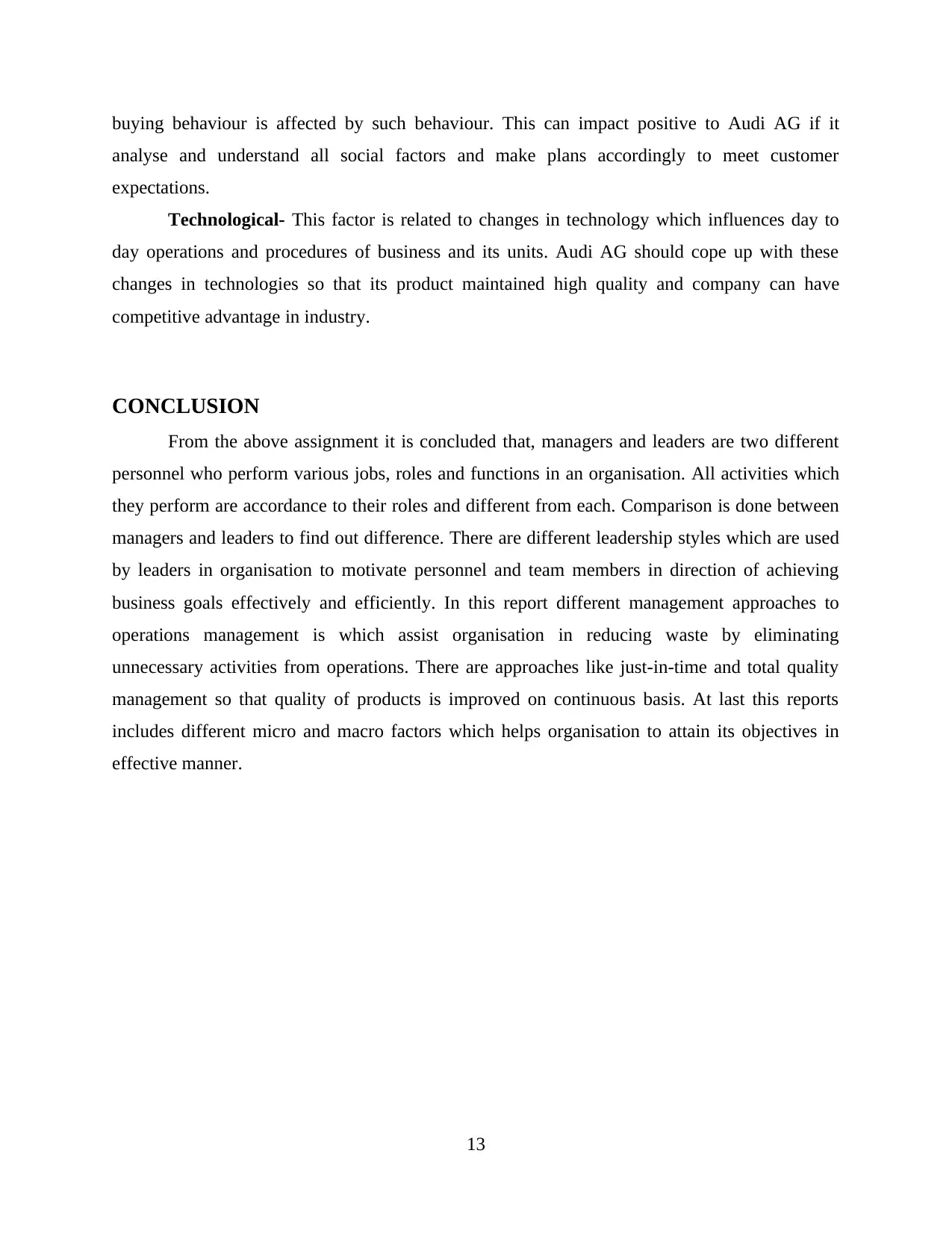
buying behaviour is affected by such behaviour. This can impact positive to Audi AG if it
analyse and understand all social factors and make plans accordingly to meet customer
expectations.
Technological- This factor is related to changes in technology which influences day to
day operations and procedures of business and its units. Audi AG should cope up with these
changes in technologies so that its product maintained high quality and company can have
competitive advantage in industry.
CONCLUSION
From the above assignment it is concluded that, managers and leaders are two different
personnel who perform various jobs, roles and functions in an organisation. All activities which
they perform are accordance to their roles and different from each. Comparison is done between
managers and leaders to find out difference. There are different leadership styles which are used
by leaders in organisation to motivate personnel and team members in direction of achieving
business goals effectively and efficiently. In this report different management approaches to
operations management is which assist organisation in reducing waste by eliminating
unnecessary activities from operations. There are approaches like just-in-time and total quality
management so that quality of products is improved on continuous basis. At last this reports
includes different micro and macro factors which helps organisation to attain its objectives in
effective manner.
13
analyse and understand all social factors and make plans accordingly to meet customer
expectations.
Technological- This factor is related to changes in technology which influences day to
day operations and procedures of business and its units. Audi AG should cope up with these
changes in technologies so that its product maintained high quality and company can have
competitive advantage in industry.
CONCLUSION
From the above assignment it is concluded that, managers and leaders are two different
personnel who perform various jobs, roles and functions in an organisation. All activities which
they perform are accordance to their roles and different from each. Comparison is done between
managers and leaders to find out difference. There are different leadership styles which are used
by leaders in organisation to motivate personnel and team members in direction of achieving
business goals effectively and efficiently. In this report different management approaches to
operations management is which assist organisation in reducing waste by eliminating
unnecessary activities from operations. There are approaches like just-in-time and total quality
management so that quality of products is improved on continuous basis. At last this reports
includes different micro and macro factors which helps organisation to attain its objectives in
effective manner.
13
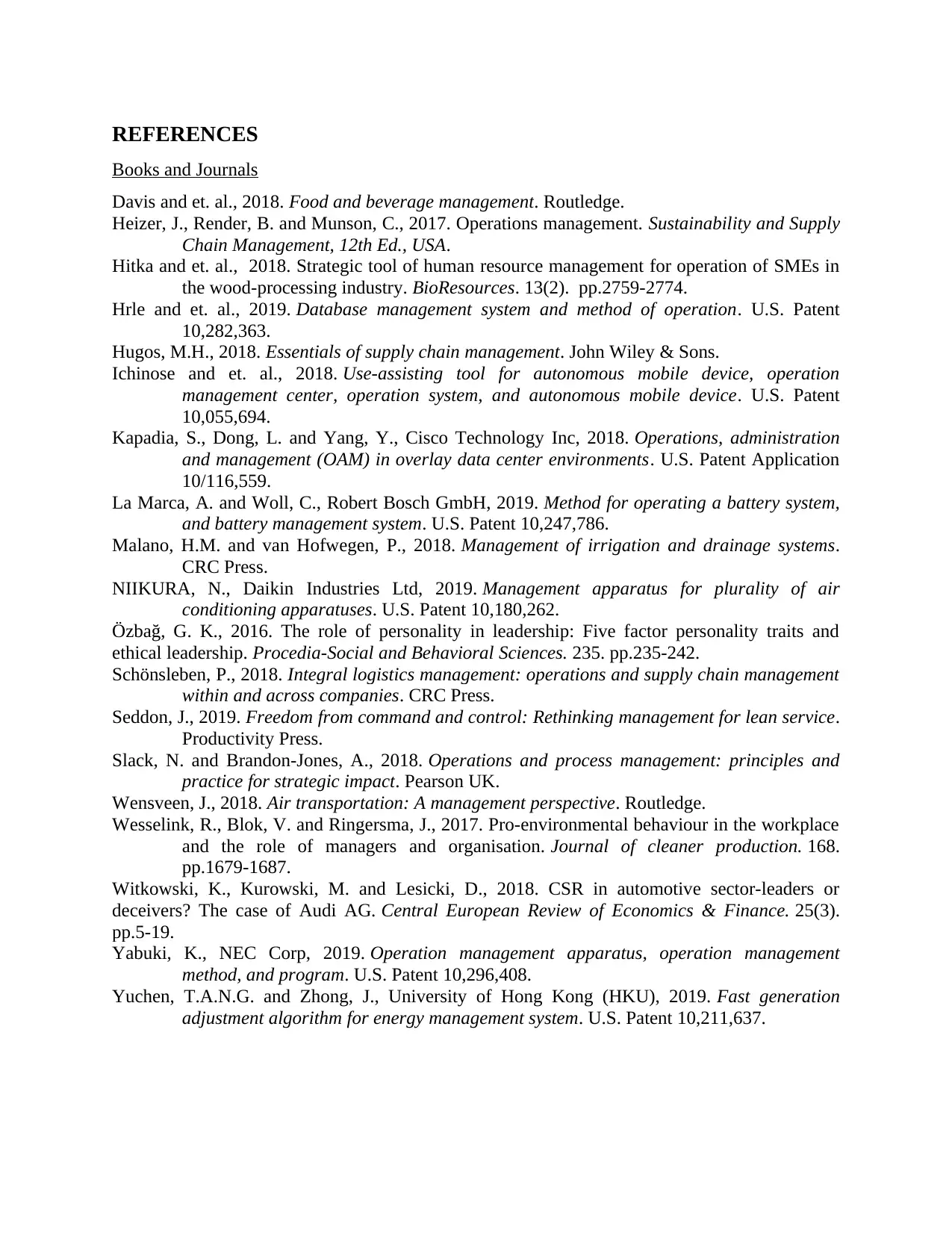
REFERENCES
Books and Journals
Davis and et. al., 2018. Food and beverage management. Routledge.
Heizer, J., Render, B. and Munson, C., 2017. Operations management. Sustainability and Supply
Chain Management, 12th Ed., USA.
Hitka and et. al., 2018. Strategic tool of human resource management for operation of SMEs in
the wood-processing industry. BioResources. 13(2). pp.2759-2774.
Hrle and et. al., 2019. Database management system and method of operation. U.S. Patent
10,282,363.
Hugos, M.H., 2018. Essentials of supply chain management. John Wiley & Sons.
Ichinose and et. al., 2018. Use-assisting tool for autonomous mobile device, operation
management center, operation system, and autonomous mobile device. U.S. Patent
10,055,694.
Kapadia, S., Dong, L. and Yang, Y., Cisco Technology Inc, 2018. Operations, administration
and management (OAM) in overlay data center environments. U.S. Patent Application
10/116,559.
La Marca, A. and Woll, C., Robert Bosch GmbH, 2019. Method for operating a battery system,
and battery management system. U.S. Patent 10,247,786.
Malano, H.M. and van Hofwegen, P., 2018. Management of irrigation and drainage systems.
CRC Press.
NIIKURA, N., Daikin Industries Ltd, 2019. Management apparatus for plurality of air
conditioning apparatuses. U.S. Patent 10,180,262.
Özbağ, G. K., 2016. The role of personality in leadership: Five factor personality traits and
ethical leadership. Procedia-Social and Behavioral Sciences. 235. pp.235-242.
Schönsleben, P., 2018. Integral logistics management: operations and supply chain management
within and across companies. CRC Press.
Seddon, J., 2019. Freedom from command and control: Rethinking management for lean service.
Productivity Press.
Slack, N. and Brandon-Jones, A., 2018. Operations and process management: principles and
practice for strategic impact. Pearson UK.
Wensveen, J., 2018. Air transportation: A management perspective. Routledge.
Wesselink, R., Blok, V. and Ringersma, J., 2017. Pro-environmental behaviour in the workplace
and the role of managers and organisation. Journal of cleaner production. 168.
pp.1679-1687.
Witkowski, K., Kurowski, M. and Lesicki, D., 2018. CSR in automotive sector-leaders or
deceivers? The case of Audi AG. Central European Review of Economics & Finance. 25(3).
pp.5-19.
Yabuki, K., NEC Corp, 2019. Operation management apparatus, operation management
method, and program. U.S. Patent 10,296,408.
Yuchen, T.A.N.G. and Zhong, J., University of Hong Kong (HKU), 2019. Fast generation
adjustment algorithm for energy management system. U.S. Patent 10,211,637.
Books and Journals
Davis and et. al., 2018. Food and beverage management. Routledge.
Heizer, J., Render, B. and Munson, C., 2017. Operations management. Sustainability and Supply
Chain Management, 12th Ed., USA.
Hitka and et. al., 2018. Strategic tool of human resource management for operation of SMEs in
the wood-processing industry. BioResources. 13(2). pp.2759-2774.
Hrle and et. al., 2019. Database management system and method of operation. U.S. Patent
10,282,363.
Hugos, M.H., 2018. Essentials of supply chain management. John Wiley & Sons.
Ichinose and et. al., 2018. Use-assisting tool for autonomous mobile device, operation
management center, operation system, and autonomous mobile device. U.S. Patent
10,055,694.
Kapadia, S., Dong, L. and Yang, Y., Cisco Technology Inc, 2018. Operations, administration
and management (OAM) in overlay data center environments. U.S. Patent Application
10/116,559.
La Marca, A. and Woll, C., Robert Bosch GmbH, 2019. Method for operating a battery system,
and battery management system. U.S. Patent 10,247,786.
Malano, H.M. and van Hofwegen, P., 2018. Management of irrigation and drainage systems.
CRC Press.
NIIKURA, N., Daikin Industries Ltd, 2019. Management apparatus for plurality of air
conditioning apparatuses. U.S. Patent 10,180,262.
Özbağ, G. K., 2016. The role of personality in leadership: Five factor personality traits and
ethical leadership. Procedia-Social and Behavioral Sciences. 235. pp.235-242.
Schönsleben, P., 2018. Integral logistics management: operations and supply chain management
within and across companies. CRC Press.
Seddon, J., 2019. Freedom from command and control: Rethinking management for lean service.
Productivity Press.
Slack, N. and Brandon-Jones, A., 2018. Operations and process management: principles and
practice for strategic impact. Pearson UK.
Wensveen, J., 2018. Air transportation: A management perspective. Routledge.
Wesselink, R., Blok, V. and Ringersma, J., 2017. Pro-environmental behaviour in the workplace
and the role of managers and organisation. Journal of cleaner production. 168.
pp.1679-1687.
Witkowski, K., Kurowski, M. and Lesicki, D., 2018. CSR in automotive sector-leaders or
deceivers? The case of Audi AG. Central European Review of Economics & Finance. 25(3).
pp.5-19.
Yabuki, K., NEC Corp, 2019. Operation management apparatus, operation management
method, and program. U.S. Patent 10,296,408.
Yuchen, T.A.N.G. and Zhong, J., University of Hong Kong (HKU), 2019. Fast generation
adjustment algorithm for energy management system. U.S. Patent 10,211,637.
1 out of 16
Related Documents
Your All-in-One AI-Powered Toolkit for Academic Success.
+13062052269
info@desklib.com
Available 24*7 on WhatsApp / Email
![[object Object]](/_next/static/media/star-bottom.7253800d.svg)
Unlock your academic potential
© 2024 | Zucol Services PVT LTD | All rights reserved.





